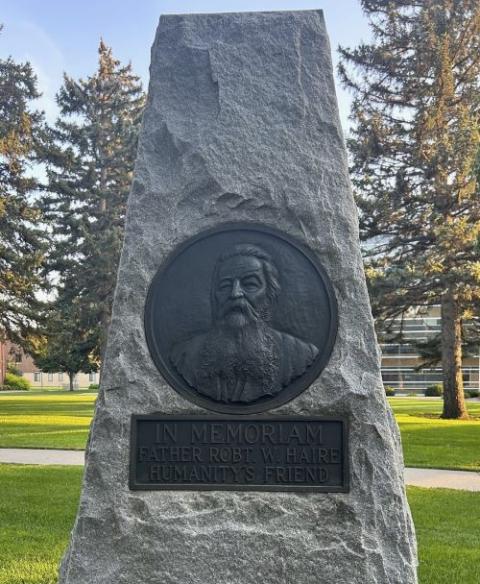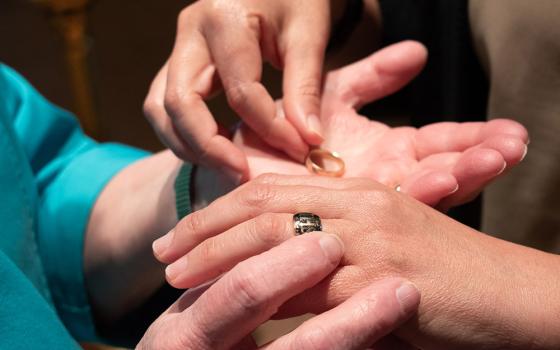
Shown is an undated portrait of Fr. Robert Haire, a socialist Catholic priest and influential direct democracy advocate who lived in Aberdeen, S.D., in the late 1800s and early 1900s. South Dakota becoming the first state in the nation to enact a statewide citizen initiative and referendum process. (AP/Presentation Sisters Archives)
Thanks to a rabble-rousing, socialist priest, it's a milestone year for direct democracy in the U.S. and not just because Ohio voters are circumventing their Republican-controlled legislature to decide for themselves if they have constitutional abortion rights.
The practice of citizen-originated ballot measures began 125 years ago when South Dakota became the first in the nation to enact a statewide initiative and referendum process. More states followed, and the movement giving voters lawmaking powers grew far bigger than Fr. Robert Haire's spirited advocacy for it.
The pioneering Catholic priest is an obscure historical figure today. But some still invoke his name in their fight to preserve voters' ballot measure rights. Others carry on with the advocating, educating and ministering that Haire set into motion — whether they know it or not.
South Dakotans still cherish being able to vote on their state's laws and constitution — and that's Haire's legacy, said Cory Heidelberger, who has led ballot-question campaigns and legally challenged Republican efforts to weaken the process. Nearly 75% of South Dakotans called citizen ballot initiatives critical to the democratic process in a 2021 statewide poll, and almost 62% opposed making it harder.

Voters fill out their ballots on Nov. 8, 2022, at Morningside Community Center in Sioux Falls, S.D. (AP, file/The Argus Leader/Erin Woodiel)
"It represents for me the fundamental idea of the equal dignity of every human being," said Heidelberger, who blogs about South Dakota politics.
The people, he said, deserve lawmaking power too: "They're no better, but they're no worse than any one legislator sitting in Pierre making a decision."
South Dakota's initiative and referendum came about during an agrarian populist movement. The political conditions were brief but just right in 1897 for lawmakers to approve it; voters passed it the following year. In a memoir compiled by the state Socialist Party, Haire is credited with writing the amendment itself. (Constitutional amendments by initiative were enacted in 1972.)
Today, residents in about half of U.S. states can put issues like Medicaid expansion and marijuana use to a public vote. Recently it's Republican lawmakers who have tried to erode the process. Democrats and left-leaning groups locked out of power in Republican-led states are using ballot measures to force votes on popular issues.
In one of 2023's most-watched examples, early voting is underway in Ohio and expected to draw heavier-than-normal turnout. This summer, Ohioans knocked down a Republican-led plan to increase signature requirements and raise the approval threshold for constitutional amendments, including the abortion one, from 50% to 60%.
"That's just a version of what we've seen from the very beginning, that legislators have always tried to cut it back," said John Matsusaka, director of the University of Southern California's Initiative and Referendum Institute.

Ohio residents line up to vote early in-person on a proposal that would have increased signature requirements and raise the approval threshold for constitutional amendments. They are in front of the Franklin County Board of Elections in Columbus, Ohio, on Aug. 3. (AP/Samantha Hendrickson, file)
The politics of using citizen ballot measures are situational. He pointed to Republicans in California and Democrats in Ohio.
"It's the guys who are out of power that can't get the time of day from the legislature that think, 'Well, maybe this is my only recourse?' " Matsusaka said.
In Citizen Lawmakers: The Ballot Initiative Revolution, David Schmidt describes the complex U.S. origins, naming Haire as one of the country's first two reformers to propose the idea.
This makes Haire, who was suspicious of politicians, the father of a critically important "escape valve," said Drey Samuelson, Democrat and former chief of staff for retired U.S. Sen. Tim Johnson of South Dakota.
"If you can't pass them through the legislature in states that don't have ballot initiatives, you're basically done," said Samuelson, who is helping lead a ballot-initiative campaign for open primaries in South Dakota. He criticized Republicans for trying to weaken the process — something he expects will continue.
Initially, Haire called for more radical change: abolishing the state's representative legislature and letting the electorate make the laws instead. He argued for it in the Aug. 8, 1891, issue of The Dakota Ruralist: "There would be no humbugging in committees as now, no secret sculduggery, and passing bills at the last hour of the legislature."

A monument dedicated to Fr. Robert Haire, a socialist priest and direct democracy advocate, stands on Northern State University campus in Aberdeen, South Dakota, on Sept. 13. Haire served on the South Dakota Board of Regents and was influential in establishing the university. (Courtesy Tom Heinz via AP)
It is hard to parse whether Haire's faith or political views motivated him, said Janine Giordano Drake, an Indiana University history professor. She said there were so many socialist clergy in the 1890s that Christian Socialist Fellowship formed with loose ties to the Socialist Party.
The Catholic Church opposed socialism, she said, but celebrated social democracy and universal voting rights.
Republican State Sen. Michael Rohl, whose district includes Brown County where Haire spent much of his ministry, told The Associated Press that ballot initiatives are a "necessary evil." They are susceptible to special interests and most voters focus on the overall issue instead of the proposed details, but they can be a check on lawmakers and party politics, he said.
Rohl, who thinks the benefits outweigh the risks, said he supports improvements but not restrictions. His main concern with the process is government attempts to claw back the right, which would make it out of reach for the average South Dakotan but not deep-pocketed special interests.
"You don't have to support most ballot measures to support the process," he said. "The ability to vote 'No' is just as important and powerful as the ability to vote 'Yes.' "
As for Haire's politics, Rohl didn't mince words: "It may have been originally created by the work of a socialist priest, but even a blind squirrel will find an acorn every now and then."
Haire's views have put him on the outs before. The well-educated, former Presbyterian from Michigan fought hard for what he believed to be right, including direct democracy, education, labor rights, women's suffrage, helping the poor and temperance.

Presentation Sr. Kathleen Bierne testifies before state lawmakers at the capitol in Pierre, South Dakota, in March 2022. Bierne is a lobbyist advocating for health care, education, housing, immigration and other issues in line with the Presentation Sisters' historic mission. (AP/Presentation Sisters)
"He loved a square-toed opponent as well as an adherent, seeing the man above the difference of honest thought," declared the Aberdeen News after his March 1916 death.
His prolific advocacy filled speeches and newsprint, but his staunch alcohol opposition led his bishop to remove him from the Aberdeen parish he founded.
Sr. Kathleen Bierne also advocates for issues she believes are right, but took a different approach than Haire, who invited her Catholic community, the Presentation Sisters, to set up a school in Aberdeen in 1886. He later became chaplain for them and their hospital.
Christian missionaries built much of the country's education and health care infrastructure, said Drake, the historian.
"It was the people who ran those missions, organizations that were the most interested in advocating for the poor," Drake said. "Where did we get democracy in this country? It's often the people who work among the poor."
In 2016, Bierne became a lobbyist, a role that relied more on building relationships with state lawmakers than breaking them to effectively advocate for health care, education, housing, immigration and other issues in line with the Presentation Sisters' historic mission.
"Some of those have become much more divisive because of the lack of balance in our own legislature," she said. "We've had to walk a much more careful route. ... We would probably not get by with Father Haire's way of dealing with life right now."
Advertisement
Even still, he was revered for living out Jesus' teachings, she said, noting a remembrance of Haire from Socialist Party leader Eugene Debs:
"He sought out the sorrowing and suffering, spent all his time in ministering to them and loved them with all his great heart."
Earlier this year, lawmakers considered adding more signature requirements for constitutional amendments by initiative. It didn't pass, but Republican sponsor Rep. Liz May argued in committee, "Shouldn't us changing our constitution be a little harder?"
Businessman Tom Heinz, an independent also with the open primaries campaign, testified against it in writing. Heinz, who has relatives buried in the same cemetery as Haire, wanted legislators to know the priest's name and how South Dakota led the way:
"There is a famous saying in our country: 'If it ain't broke, don't fix it!' Well, the initiative process in our state isn't broken."
___
Associated Press religion coverage receives support through the AP's collaboration with The Conversation US, with funding from Lilly Endowment Inc. The AP is solely responsible for this content.







